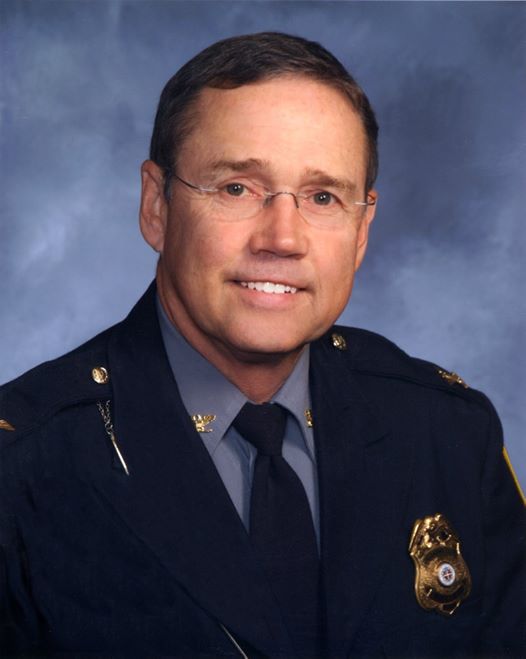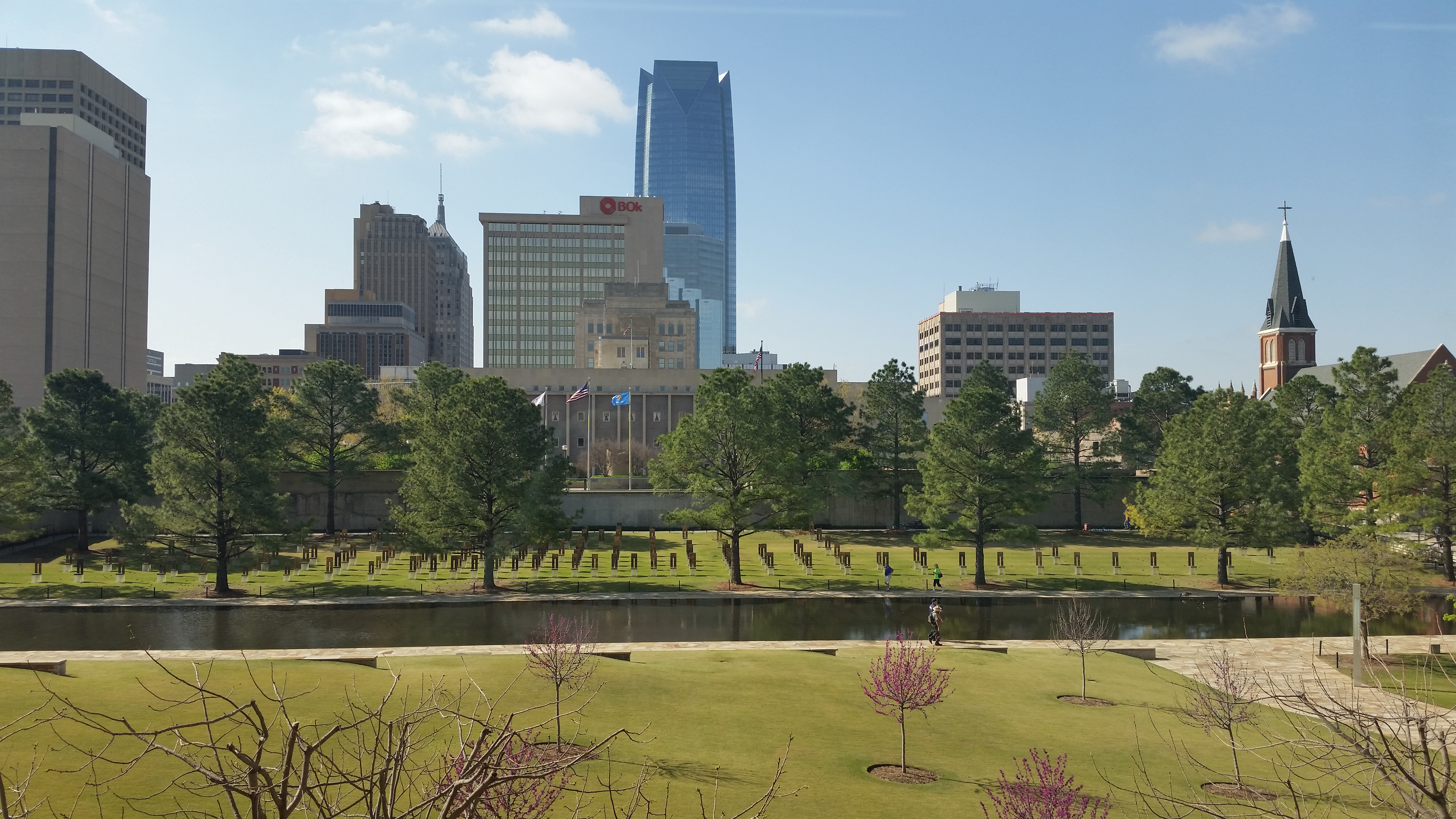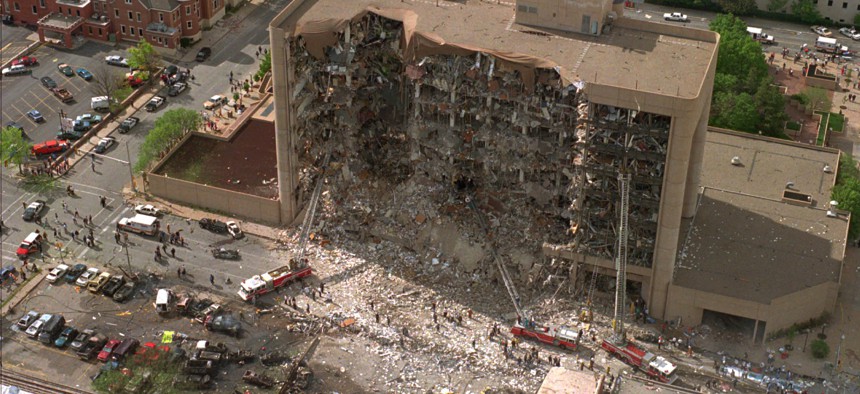Connecting state and local government leaders
Twenty years after the calamity, the response “is a model for other cities in how to handle a disaster and how to treat your citizens after.”
OKLAHOMA CITY — Oklahomans understandably pride themselves for their Herculean resilience, withstanding regular thunderstorms, fist-sized hail, destructive tornadoes and, on April 19, 1995, a domestic terrorist attack on the Alfred P. Murrah Federal Building.
But as the 20th anniversary of the Oklahoma City bombing nears, it’s the municipality’s crisis response that should be remembered for saving lives and keeping the community informed.
Without effective city communication, bomber Timothy McVeigh would not have been arrested within 90 minutes of the explosion, rescue efforts would have stalled and, many believe, the city would’ve been more adversely scarred by tragedy two decades later.

“We had a protocol of command, but it wasn’t as practiced because it was it was fairly new. There were things written into our procedures, as far as responses, that really don’t compare today as a result of the bombing,” said Oklahoma City Police Chief Bill Citty, who was the force’s public information officer at the time. “Now, compared to then, everybody in the department is much more clear on what their roles and responsibilities are.”
On the day of the attack, the the city’s Water Resources Board was holding a 9 a.m. hearing on a groundwater permit when a Ryder rental truck across the street containing a fertilizer bomb and 13 barrels of fuel detonated in front of the nine-story federal building.
The building cratered, hundreds more were damaged, nearby cars ignited, and shattered glass became flying daggers leaving 168 people dead at final count.
Within minutes, FBI investigators had a vehicle identification number off the truck’s axle they tracked to a Kansas rental agency, not knowing an Oklahoma state trooper was simultaneously arresting the renter, McVeigh, for possessing a concealed weapon after pulling him over for missing license plates. A second suspect connected to the bombing, Terry Nichols, was arrested in Kansas a few days later.
Inadequate communication among local, state and federal agencies had to be overcome in the initial hours of the investigation, at the time the largest in U.S. history, Citty said. But having worked through the challenges then makes the relationships easier to build and maintain today, he added.
“City officials went out of their way to let the public know, to the best of their knowledge, what was going on with hourly press briefings at First Christian Church,” said Oklahoma City National Memorial and Museum Director of Video Tony Stizza, a local photojournalist during the attack.
“They were very protective of the victims’ families but also kept everyone informed. I don’t remember people saying, ‘They’re not talking,’” he said in an interview at the memorial.
Citty, who had been the police department’s information officer for two years when the bombing occurred, was central to the city’s effort to protect the investigation until both suspects were in custody while remaining transparent with victims’ families about what was being done and how.
In any incident, man-made or natural, the priority is peoples’ lives, Citty said, so first responders worked quickly to set up a command post, perimeter, triage areas and barriers allowing emergency response to move around unimpeded by the general populace.
“With social media, it would be a lot easier today because we could put information out,” Citty said. “In other ways it would probably be more difficult because take all the conspiracy theories that went on then, and add social media in with all the different outlets and it would be tremendous—maybe even overwhelming—to try and deal with the propaganda coming out.”
Stizza remembers the fire department also being “very media savvy,” which, combined with Oklahomans’ predisposition toward generosity, meant emergency personnel “wanted for nothing” when they put out the call for flashlight batteries or gloves. Supplies arrived by the truckload.
Rather than leaving people guessing while holed up in a command center, then-Mayor Jim Norick made sure he was on the same wavelength and seen publicly as much as police and fire officials, Stizza said.
“Our city was learning to work interdepartmentally with each other,” Stizza said. “We’ve had our fair share of tornadoes, and they can be pretty bad, but we’ve refined our response to where now it’s second nature.”

The Oklahoma City National Memorial (Photo by Dave Nyczepir / RouteFifty.com)
No two catastrophes are the same, Citty said, which is why his department has emphasized planning ahead since the events of 1995.
A centralized reporting process for departments, when covering an area searching for those trapped alive in the wake of a tornado, is most efficient, Citty said—timely advice with recent, large tornadoes touching down in Illinois and other Midwestern states.
“Sad to say, we get a lot of real-life practice with each other every spring working with communication equipment,” Citty said. “Tabletop roleplaying ‘what ifs’—that’s far and above better than it’s ever been.”
Nationally, the Sept. 11, 2001, terrorist attacks and Hurricane Katrina honed the Federal Emergency Management Agency’s relief protocols and federal guidelines to create a “national standard to response” never before seen, Citty added.
Within Oklahoma City, the National Memorial and Museum is not simply a monument but an active arm of the city promoting the healing that began with Rev. Billy Graham and then President Bill Clinton’s remarks at the memorial service the Sunday three days after the bombing.
A reflecting pool stretches where NW 5th Street, the downtown thoroughfare the explosion occurred along, once ran, while the “Survivor Tree,” a hundred-something-year-old elm unaffected by the blast, is not far off—a testament to the city’s continued growth.
The words “May all who leave here know the impact of violence” greet visitors to the museum, containing a Gallery of Honor with an artifact from each victim, like glasses or a favorite book, picked by their families.
An annual Oklahoma City Memorial Marathon is hosted by the institution and continues to communicate the city has not been beaten by tragedy.
“To me it all stems back to what happened here. Police, fire, I think everybody has learned from this,” Stizza said. “Oklahoma City is a model for other cities in how to handle a disaster and how to treat your citizens after. The challenge is that we pass these lessons on to the next generation.”

NEXT STORY: How Suffolk future-proofed city hall




